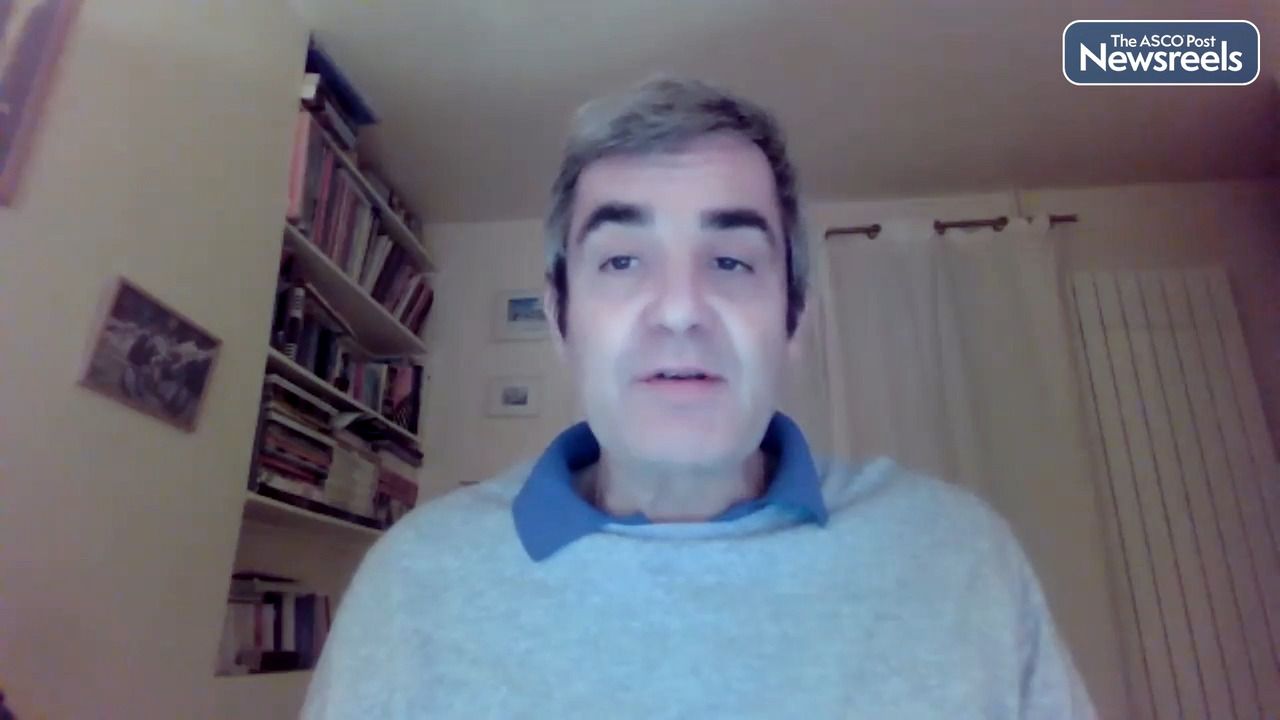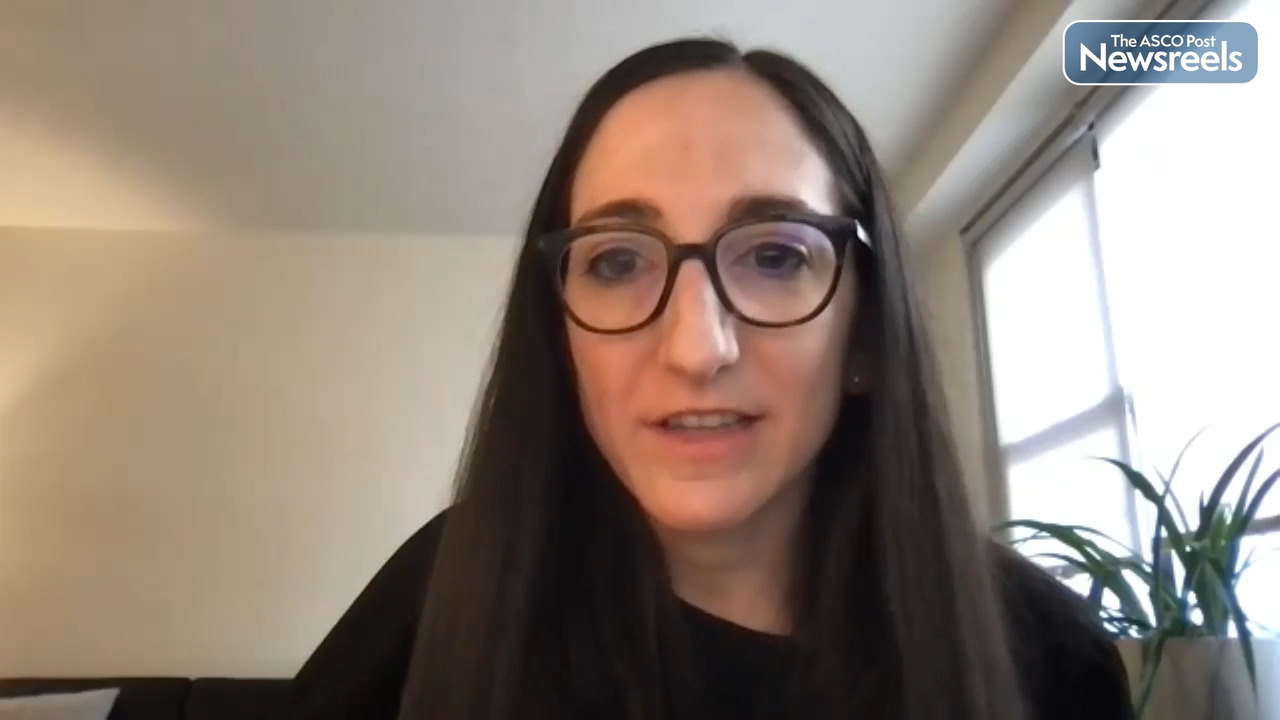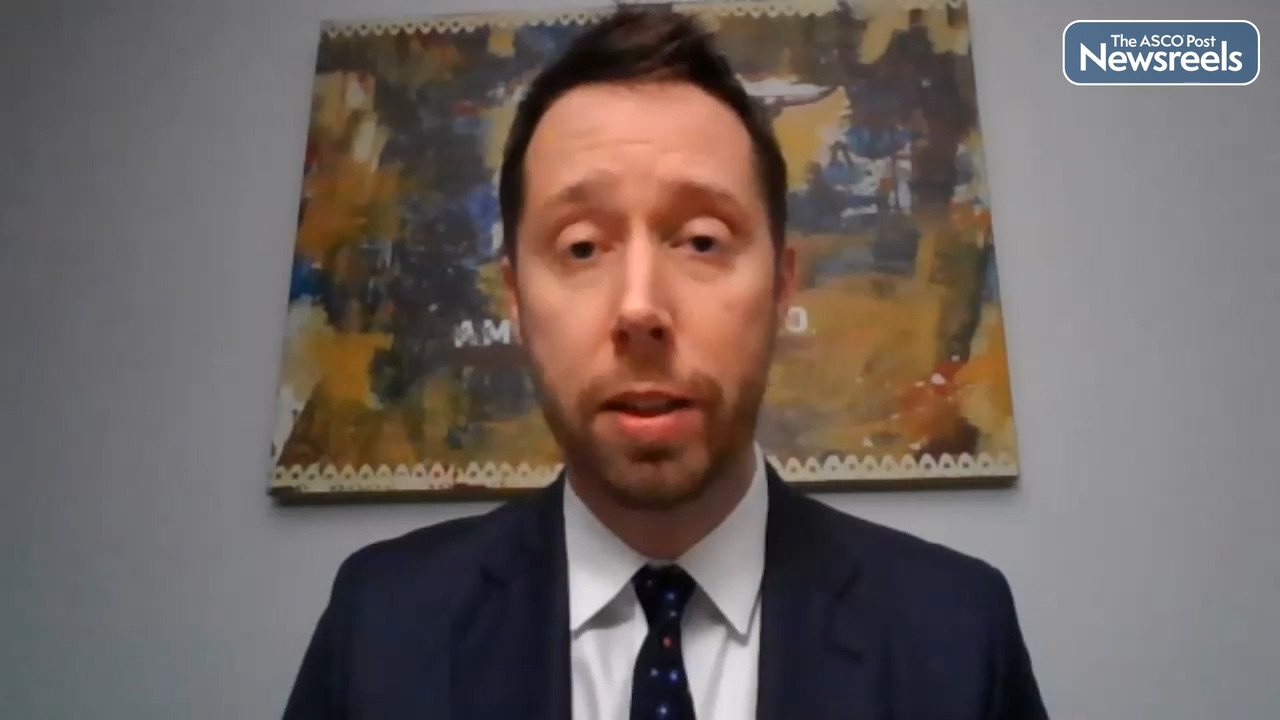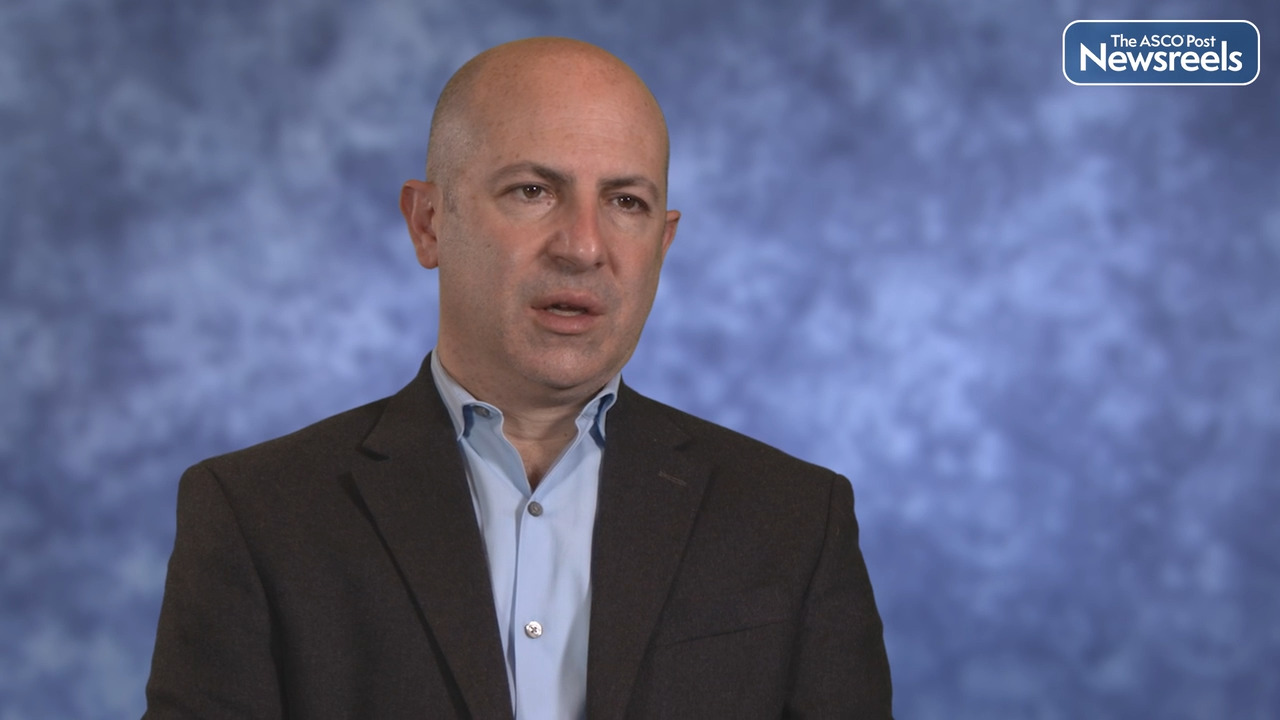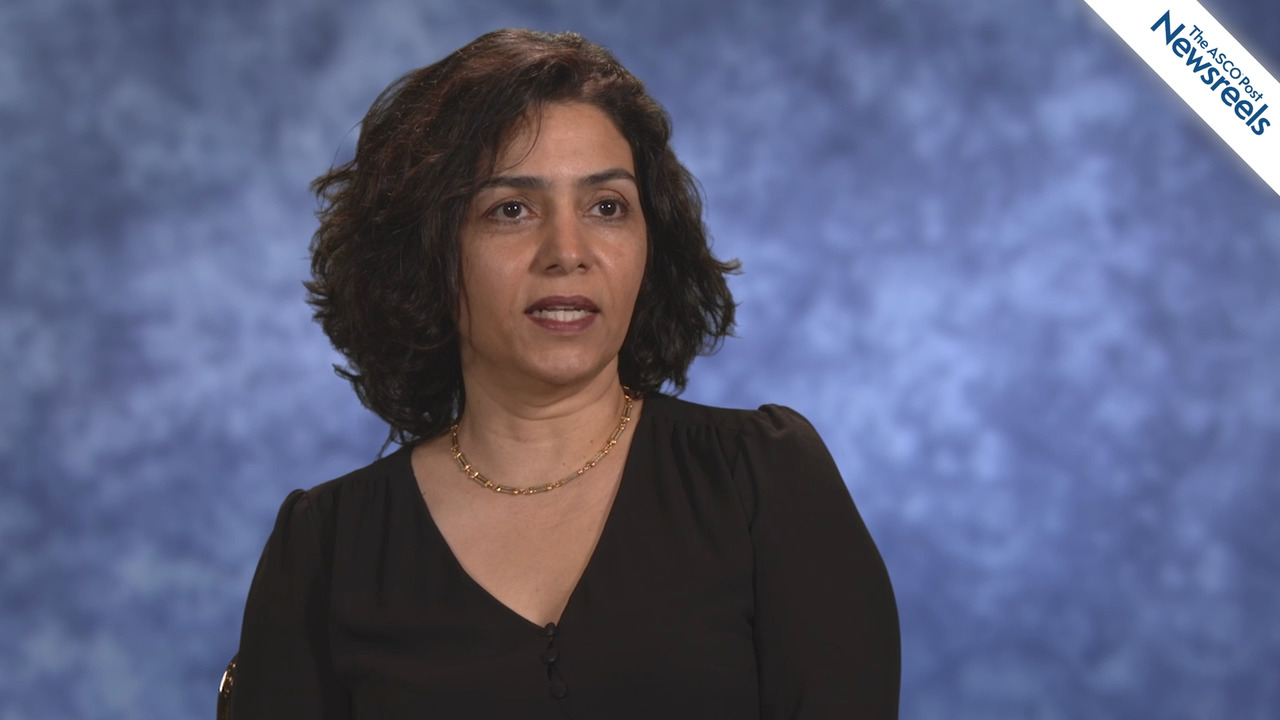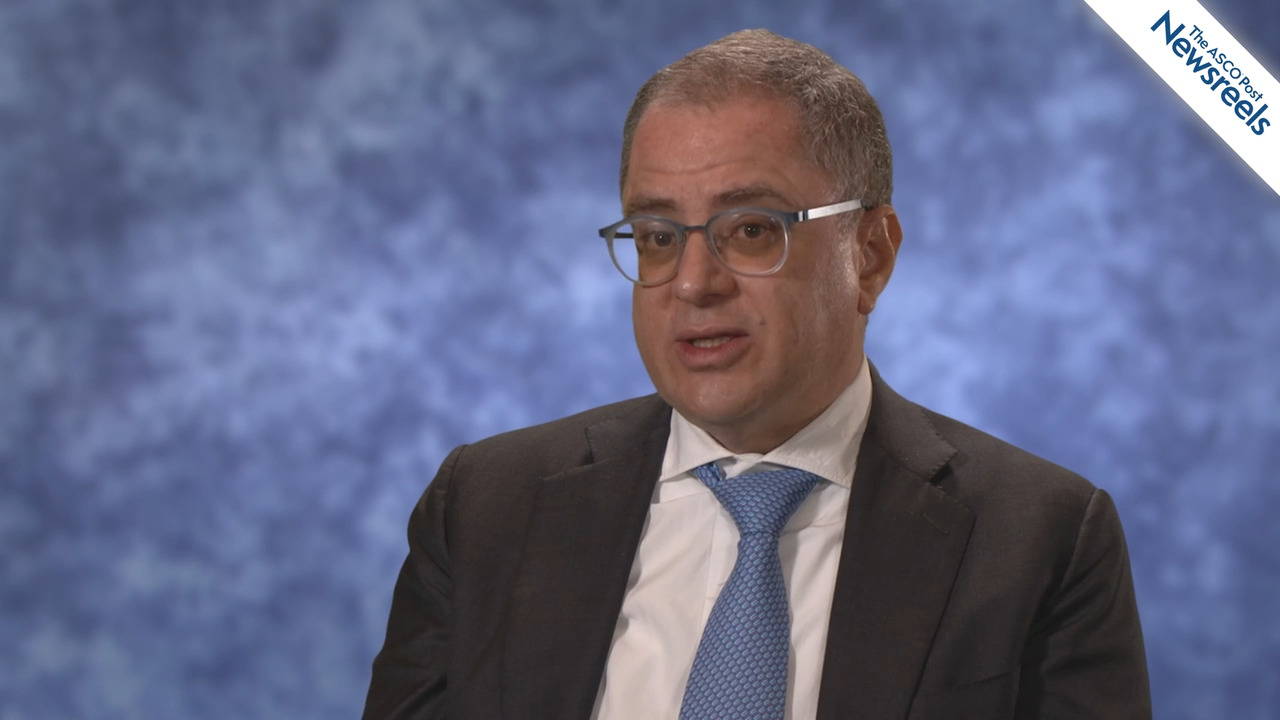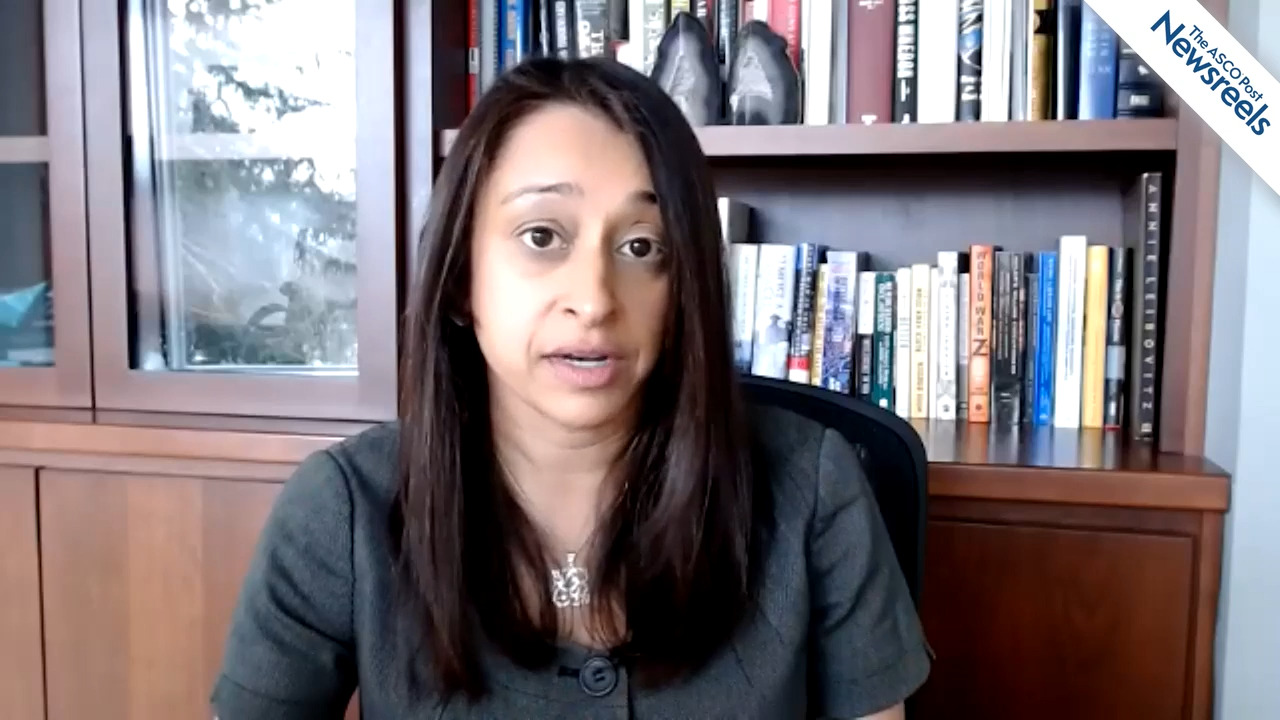Mosunetuzumab Meets Primary Endpoint of Phase II Trial in Relapsed or Refractory Follicular Lymphoma
The bispecific antibody mosunetuzumab achieved deep and durable remissions as monotherapy in patients with relapsed or refractory follicular lymphoma, according to the results of a pivotal phase II trial presented at the 2021 American Society of Hematology (ASH) Annual Meeting & Exposition.1 In ...
Expert Point of View: Laurie H. Sehn, MD, MPH, and Alex Herrera, MD
Laurie H. Sehn, MD, MPH, Clinical Professor with the BC Cancer Centre for Lymphoid Cancer and University of British Columbia, Vancouver, Canada, and Alex Herrera, MD, Associate Professor in Hematology and Hematopoietic Cell Transplantation at the Beckman Research Institute of City of Hope, Duarte,...
ZUMA-7: Axicabtagene Ciloleucel Quadruples Event-Free Survival in Large B-Cell Lymphoma
In the primary analysis of the phase III ZUMA-7 trial, examining second-line therapy for relapsed or refractory large B-cell lymphoma, the CAR T-cell therapy axicabtagene ciloleucel led to a fourfold increase in event-free survival over the standard of care. These findings were presented at the...
Expert Point of View: Laurie H. Sehn, MD, MPH
The moderator of the session, Laurie H. Sehn, MD, MPH, Clinical Professor at the BC Cancer Centre for Lymphoid Cancer and University of British Columbia, Vancouver, Canada, called the results of the TRANSFORM trial “quite remarkable” and said chimeric antigen receptor (CAR) T-cell therapy has the...
TRANSFORM: Lisocabtagene Maraleucel Improves Outcomes in Relapsed or Refractory Large B-Cell Lymphoma
Chimeric antigen receptor (CAR) T-cell therapy with lisocabtagene maraleucel could prove to be the new standard-of-care treatment for patients with relapsed or refractory large B-cell lymphoma in the second-line setting, according to data presented at the 2021 American Society of Hematology (ASH)...
Expert Point of View: Jane N. Winter, MD, and Christopher R. Flowers, MD, MS
Jane N. Winter, MD, Professor of Medicine at Northwestern University’s Feinberg School of Medicine and 2022 President of the American Society of Hematology (ASH), and Christopher R. Flowers, MD, MS, Chair of the Department of Lymphoma/Myeloma at The University of Texas MD Anderson Cancer Center,...
POLARIX: Addition of Polatuzumab Vedotin-piiq to Standard of Care Significantly Reduces Progression of Diffuse Large B-Cell Lymphoma
As a first-line treatment of intermediate- or high-risk diffuse large B-cell lymphoma, the addition of the antibody-drug conjugate polatuzumab vedotin-piiq to standard-of-care therapy resulted in a 27% reduction in the relative risk of disease progression, relapse, or death, with a similar safety...
Expert Point of View: Ajay K. Nooka, MD, MPH, FACP
Ajay K. Nooka, MD, MPH, FACP, Associate Professor in the Department of Hematology and Medical Oncology at Winship Cancer Institute, Emory University, Atlanta, commented on the promising emergence of bispecific T-cell engaging (bispecific) antibodies, as represented by studies presented at the 2021...
Bispecific Antibodies With Multiple Targets Moving Forward in Multiple Myeloma
Poor outcomes are observed in patients with myeloma who are refractory to multiple classes of therapies, with the average patient experiencing disease progression in up to 6 months and living no longer than 6 to 15 months. Patients often rapidly cycle through regimens that use less effective or...
Researchers Identify Biomarkers That May Help to Predict Response to Immunotherapy for Melanoma
Melanoma is often curable when detected and treated in its early stages. However, the disease can rapidly spread to other organs in the body and become deadly. Immune checkpoint inhibitors have transformed the treatment of certain cancers, including melanoma, and improved patient care. But despite...
Matthew R. Zibelman, MD, on Renal Cell Carcinoma: New Results on Combination of Nivolumab and Axitinib
Matthew R. Zibelman, MD, of Fox Chase Cancer Center, discusses phase I/II results from a study of treatment-naive patients with advanced renal cell carcinoma who received a combination of the immunotherapy (IO) nivolumab and the tyrosine kinase inhibitor (TKI) axitinib. The findings suggest that the efficacy of this regimen is comparable to that of currently available IO/TKI combinations for this population and has a similar safety profile (Abstract 291).
Neoadjuvant Enfortumab Vedotin-ejfv in Cisplatin-Ineligible Patients With Muscle-Invasive Bladder Cancer
The antibody-drug conjugate enfortumab vedotin-ejfv is effective in patients with muscle-invasive bladder cancer who are not eligible for cisplatin chemotherapy, according to data from cohort H of the phase IB/II EV-103 clinical trial being presented at the 2022 ASCO Genitourinary Cancers Symposium ...
Differences in Risk of Severe Adverse Events in Women vs Men Receiving Immunotherapy, Targeted Therapy, or Chemotherapy in Cancer Clinical Trials
In a study reported in the Journal of Clinical Oncology, Joseph M. Unger, PhD, and colleagues found that women in clinical trials of chemotherapy, immunotherapy, or targeted therapy had a significantly greater risk for severe adverse events overall—and, particularly, with immunotherapy. As stated...
Potential Use of FDG-PET Findings in Reducing Duration of Immunotherapy in Patients With Advanced Melanoma
In a Danish retrospective study reported in the International Journal of Cancer, Ellebaek et al found that patients with advanced melanoma responding to PD-1 inhibitor therapy who stopped treatment within 18 months had improved survival outcomes when fluorodeoxyglucose (F-18) positron-emission...
Cemiplimab-rwlc vs Single-Agent Chemotherapy in Recurrent Cervical Cancer After First-Line Platinum-Based Chemotherapy
As reported in The New England Journal of Medicine by Krishnansu S. Tewari, MD, and colleagues, the phase III EMPOWER-Cervical1/GOG-3016/ENGOT-cx9 trial has shown improved overall survival with cemiplimab-rwlc vs investigator’s choice of single-agent chemotherapy in patients with cervical cancer...
Updated Efficacy and Safety Data From CheckMate 743: First-Line Nivolumab/Ipilimumab vs Chemotherapy for Unresectable Malignant Pleural Mesothelioma
With a follow-up of at least 3 years, the results from the CheckMate 743 study represent the first long-term survival data in a phase III study evaluating first-line immune checkpoint inhibition in patients with unresectable malignant pleural mesothelioma. Overall, 23% of patients treated with...
Report Finds Cancer Immunotherapy Clinical Trials Continue to Grow Globally
The Cancer Research Institute (CRI), a nonprofit organization dedicated to the discovery and development of powerful immunotherapies for all types of cancer, has announced the publication of a new analysis of the global landscape of clinical development of drugs that target the PD-1/PD-L1 immune...
Neoadjuvant Atezolizumab Plus Gemcitabine and Cisplatin in Muscle-Invasive Bladder Cancer
In a phase II trial reported in the Journal of Clinical Oncology, Funt et al found that the combination of neoadjuvant atezolizumab with gemcitabine and cisplatin resulted in a high rate of tumor downstaging to < pT2N0 in patients with muscle-invasive bladder cancer. Study Details The U.S....
Sara A. Hurvitz, MD, on HER2-Positive Metastatic Breast Cancer: T-DXd vs T-DM1
Sara A. Hurvitz, MD, of the University of California, Los Angeles Jonsson Comprehensive Cancer Center, discusses phase III findings from the DESTINY-Breast03 trial, which compared ado-trastuzumab deruxtecan (T-DXd) with standard-of-care trastuzumab emtansine (T-DM1) in patients with HER2-positive metastatic breast cancer. T-DXd showed superior progression-free survival across subgroups of patients previously treated with trastuzumab and a taxane, including those with brain metastases (Abstract GS3-01).
Concordance for Low HER2 Protein Expression in Breast Cancer Tissue Using Standard Immunohistochemistry Assays
In a study reported in JAMA Oncology, Fernandez et al found that scoring accuracy for low HER2 protein expression (0 or 1+) in breast cancer tissue on standard immunohistochemistry (IHC) assays was poor. As observed by the investigators, the findings pose issues for investigation of fam-trastuzumab ...
Expert Point of View: Angela DeMichele, MD, MSCE
Angela DeMichele, MD, MSCE, the Alan and Jill Miller Professor in Breast Cancer Excellence at the Perelman School of Medicine of the University of Pennsylvania in Philadelphia, commented on NIMBUS1 for The ASCO Post. She said obtaining information on tumor mutational burden is simple, as it is part ...
Dual Checkpoint Inhibitor Therapy Elicits Responses in Highly Mutated Breast Cancer
Patients with advanced HER2-negative metastatic breast cancer and high tumor mutational burden achieved responses—often durable—from treatment with the immunotherapy doublet of nivolumab and ipilimumab, according to results of the phase II NIMBUS trial reported at the 2021 San Antonio Breast Cancer ...
Expert Point of View: Debu Tripathy, MD, and Hope S. Rugo, MD, FASCO
The ASCO Post asked Debu Tripathy, MD, Professor and Chair of Medical Breast Oncology at The University of Texas MD Anderson Cancer Center, Houston, and Hope S. Rugo, MD, FASCO, Professor of Medicine, Director of Breast Oncology and Clinical Trials Education at the University of California San...
Datopotamab Deruxtecan Shows Activity in Advanced Triple-Negative Breast Cancer
Datopotamab deruxtecan, an antibody-drug conjugate directed against trophoblast cell surface antigen-2 (Trop-2), is showing promise as a treatment for relapsed or refractory advanced triple-negative breast cancer, according to early findings from the phase I TROPION-PanTumor01 trial presented...
Expert Point of View: Hope S. Rugo, MD, FASCO
The discussant of KEYNOTE-522 at the 2021 San Antonio Breast Cancer Symposium, Hope S. Rugo, MD, FASCO, Professor of Medicine and Director of Breast Oncology and Clinical Trials Education at the University of California San Francisco Comprehensive Cancer Center, commented: “We are clearly making...
KEYNOTE-522: Sensitivity Analyses Confirm Value of Neoadjuvant Pembrolizumab in Triple-Negative Breast Cancer
Updated results from the pivotal KEYNOTE-522 trial have confirmed the benefit of neoadjuvant therapy with pembrolizumab plus chemotherapy in patients with early triple-negative breast cancer.1 The results were presented at the 2021 San Antonio Breast Cancer Symposium by Peter Schmid, MD, PhD,...
Expert Point of View: Anthony El-Khoueiry, MD
Anthony El-Khoueiry, MD, Member of the Section of Gastrointestinal Cancers, Director of the phase I program, and Associate Professor of Clinical Medicine at the Keck School of Medicine of the University of Southern California and USC Norris Comprehensive Cancer Center, said the findings of the...
HIMALAYA Trial: First-Line Tremelimumab Plus Durvalumab Improves Overall Survival in Unresectable Hepatocellular Carcinoma
Patients with advanced, unresectable hepatocellular carcinoma may be gaining another first-line treatment option. In the global phase III HIMALAYA trial, a single priming dose of tremelimumab plus regular-interval durvalumab significantly improved overall survival, according to Ghassan K....
Expert Point of View: Nilofer Azad, MD
Nilofer Azad, MD, Professor of Oncology at Johns Hopkins University School of Medicine and Co-Director of Cancer Genetics and Epigenetics at the Sidney Kimmel Comprehensive Cancer Center, Baltimore, was invited to discuss the results of the phase III TOPAZ-1 study, which found an overall survival...
TOPAZ-1: Overall Survival Prolonged With First-Line Immunotherapy Plus Chemotherapy in Biliary Tract Cancer
For the first time, a phase III study has shown an overall survival benefit for upfront treatment using immunotherapy plus chemotherapy in advanced biliary tract cancer. In the TOPAZ-1 trial, the addition of the anti–PD-L1 agent durvalumab to gemcitabine plus cisplatin significantly improved...
Sugemalimab After Concurrent or Sequential Chemoradiation for Unresectable Stage III NSCLC
In an interim analysis of the Chinese phase III GEMSTONE-301 study reported in The Lancet Oncology, Zhou et al found that the PD-L1 inhibitor sugemalimab prolonged progression-free survival vs placebo in patients with locally advanced unresectable stage III non–small cell lung cancer (NSCLC)...
PACIFIC Trial: 5-Year Survival Outcomes With Durvalumab After Chemoradiotherapy in Stage III NSCLC
As reported in the Journal of Clinical Oncology by Spigel et al, long-term follow-up of the phase III PACIFIC trial has shown maintained progression-free and overall survival benefits with consolidation durvalumab vs placebo after chemoradiotherapy in unresectable stage III non–small cell lung...
CheckMate 648: Nivolumab Plus Chemotherapy or Ipilimumab vs Chemotherapy in Previously Untreated Advanced Esophageal Squamous Cell Carcinoma
As reported in The New England Journal of Medicine by Doki et al, the phase III CheckMate 648 trial has shown improved overall survival with nivolumab combined with chemotherapy or ipilimumab vs chemotherapy alone in patients with previously untreated advanced esophageal squamous cell carcinoma, in ...
Use of Autologous Metastasis Mutation–Reactive TILs in Metastatic Breast Cancer
In a National Institutes of Health study reported in the Journal of Clinical Oncology, Zacharakis et al found that treatment with autologous tumor-infiltrating lymphocytes (TILs) reactive to mutations in metastatic lesions produced responses in patients with metastatic breast cancer. Study Details...
Thierry André, MD, on Esophagogastric Adenocarcinoma: New Findings on Nivolumab and Ipilimumab
Thierry André, MD, of Sorbonne University and Saint-Antoine Hospital, discusses phase II results from the GERCOR NEONIPIGA study, which suggests neoadjuvant therapy with nivolumab and ipilimumab may be associated with a high pathologic complete response rate in patients with localized microsatellite instability–high or mismatch repair–deficient esophagogastric adenocarcinoma. This study raises the question of whether surgery could be delayed or avoided for some patients (Abstract 244).
Romain Cohen, MD, PhD, on Metastatic Colorectal Cancer: Long-Term Follow-up on Nivolumab Plus Ipilimumab
Romain Cohen, MD, PhD, of Sorbonne University and Saint-Antoine Hospital, discusses phase II results of the GERCOR NIPICOL study, which suggests nivolumab plus ipilimumab at a fixed duration of 1 year continued to show durable activity in patients with chemoresistant microsatellite instability–high/mismatch repair–deficient metastatic colorectal cancer after 3 years of follow-up. Dr. Cohen points out there is now some question as to whether all patients need 2 years of therapy (Abstract 13).
Addition of Sugemalimab to Platinum-Based Chemotherapy for Metastatic Squamous or Nonsquamous NSCLC
In the Chinese phase III GEMSTONE-302 trial reported in The Lancet Oncology, Caicun Zhou, MD, and colleagues found that the addition of the PD-L1 inhibitor sugemalimab to platinum-based chemotherapy improved progression-free survival in the first-line treatment of metastatic squamous or nonsquamous ...
Melissa Amy Lumish, MD, on Rectal Cancer: PD-1 Blockade for Mismatch Repair–Deficient Disease
Melissa Amy Lumish, MD, of Memorial Sloan Kettering Cancer Center, discusses new findings showing a 100% complete response rate to PD-1 blockade alone among the first 11 patients with locally advanced mismatch repair–deficient rectal cancer treated with this approach. None of the patients required chemoradiation or surgery, thus avoiding their attendant morbidities, and so PD-1 blockade may represent a new treatment paradigm. Follow-up on the durability of response is needed (Abstract 16).
Van K. Morris, MD, on Metastatic Colorectal Cancer: Early Trial Results on Encorafenib, Cetuximab, and Nivolumab
Van K. Morris, MD, of The University of Texas MD Anderson Cancer Center, discusses phase I/II data suggesting that encorafenib plus cetuximab and nivolumab is safe and well tolerated for patients with microsatellite-stable BRAF V600E–mutated metastatic colorectal cancer (Abstract 12).
FDA Approves New Label Update for CAR T-Cell Therapy Axicabtagene Ciloleucel
On January 31, the FDA approved an update to the prescribing information for axicabtagene ciloleucel (Yescarta) to include use of prophylactic corticosteroids across all approved indications. Axicabtagene ciloleucel is now the first and only chimeric antigen receptor (CAR) T-cell therapy with...
Trastuzumab, Pertuzumab, and Docetaxel for Advanced HER2-Mutant NSCLC
In a French phase II trial (IFCT-1703-R2D2) reported in the Journal of Clinical Oncology, Julien Mazieres, MD, PhD, and colleagues found that the combination of trastuzumab, pertuzumab, and docetaxel produced durable responses in previously treated patients with advanced HER2-mutant non–small cell...
Addition of Radiotherapy to Durvalumab Plus Tremelimumab in Patients With Metastatic NSCLC Refractory to PD-1/PD-L1 Inhibitor Therapy
In a phase II trial reported in The Lancet Oncology, Jonathan Schoenfeld, MD, and colleagues found that the addition of low-dose or hypofractionated radiotherapy to durvalumab plus tremelimumab did not improve objective response rates in patients with metastatic non–small cell lung cancer (NSCLC)...
Zev A. Wainberg, MD, on Gastric or Gastroesophageal Junction Adenocarcinoma: Follow-up Data on Pembrolizumab and Chemotherapy
Zev A. Wainberg, MD, of the University of California, Los Angeles, discusses an update, of 25 additional months, on phase III safety and efficacy results from the KEYNOTE-062 trial. This study compared pembrolizumab with or without chemotherapy vs chemotherapy alone for patients with PD-L1–positive advanced gastric or gastroesophageal junction adenocarcinoma (Abstract 243).
Addition of Spartalizumab to Dabrafenib/Trametinib for BRAF V600–Mutant Advanced Melanoma
As reported in the Journal of Oncology by Reinhard Dummer, MD, and colleagues, the phase III COMBI-i trial has shown no significant progression-free survival benefit with the addition of the anti–PD-1 antibody spartalizumab to dabrafenib and trametinib in patients with no prior systemic treatment...
Addition of Perioperative Trastuzumab to Neoadjuvant Chemoradiation for Patients With HER2-Overexpressing Esophageal Adenocarcinoma
As reported in The Lancet Oncology by Howard P. Safran, MD, and colleagues, the phase III NRG Oncology/RTOG-101 trial has shown no significant disease-free survival benefit with the addition of perioperative trastuzumab to neoadjuvant chemoradiation in previously untreated patients with...
Lenvatinib/Pembrolizumab vs Chemotherapy in Previously Treated Patients With Advanced Endometrial Cancer
As reported in The New England Journal of Medicine by Vicky Makker, MD, and colleagues, the phase III Study 309-KEYNOTE-775 trial has shown prolonged progression-free and overall survival with lenvatinib plus pembrolizumab vs physician’s choice of chemotherapy among previously treated patients with ...
Afsaneh Barzi, MD, PhD, on Colorectal Cancer: Early Data on Regorafenib and Pembrolizumab
Afsaneh Barzi, MD, PhD, of City of Hope Comprehensive Cancer Center and AccessHope, discusses results from a phase I/II study of regorafenib and pembrolizumab in refractory microsatellite-stable colorectal cancer. Although the trial did not meet its primary endpoint, the median overall survival is “provocative,” says Dr. Barzi. An analysis of biomarkers to identify patients with a longer duration of benefit is ongoing (Abstract 15).
Ghassan K. Abou-Alfa, MD, MBA, on Hepatocellular Carcinoma: Open-Label Trial of Tremelimumab and Durvalumab
Ghassan K. Abou-Alfa, MD, MBA, of Memorial Sloan Kettering Cancer Center and Weill Medical College at Cornell University, discusses phase III results of the HIMALAYA trial, which showed the combination of a single priming dose of tremelimumab added to durvalumab is superior to sorafenib for patients with unresectable hepatocellular carcinoma (Abstract 379).
Nilofer Saba Azad, MD, on Novel Treatment Combinations Under Study in Biliary Tract Cancers
Nilofer Saba Azad, MD, of Johns Hopkins Sidney Kimmel Cancer Center, assesses the findings from the phase III TOPAZ-1 trial, a study of durvalumab in combination with gemcitabine plus cisplatin in patients with advanced biliary tract cancer. Dr. Azad explains why the study sets a potential new standard of care of gemcitabine plus cisplatin and durvalumab in unselected patients.
Pembrolizumab for Adjuvant Treatment of Stage IIB or IIC Melanoma
On December 3, 2021, pembrolizumab was approved for adjuvant treatment of adult and pediatric (≥ 12 years of age) patients with stage IIB or IIC melanoma following complete resection.1 Supporting Efficacy Data Approval was based on findings in the phase III, double-blind KEYNOTE-716 trial...


